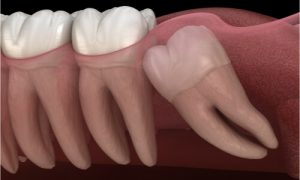Our molars play an essential role in our digestive system. They help breakdown food into small pieces which makes them easier to swallow and digest. However, molars are also susceptible to breaking and damages. Especially when you accidentally chewed on bones or other hard objects in your meal. In some cases, molars are impacted, which makes them hard to reach when brushing. In situations like this, they are even more vulnerable to cavities and tooth decay.
The wisdom tooth has a high possibility of being impacted, and it usually ends with a tooth extraction. However, the process cannot be performed with regular tooth removal. Instead, surgical extraction is needed. If you want to learn more, read this blog www.bondibeachdental.com.au/broken-wisdom-tooth.
What are Molars?
To understand why molars are needed to be removed in some cases, we must learn its definition, function, and possible causes why tooth extraction is required. We will cover all that information in this article and the aftercare treatment, and tips to preserve your oral hygiene. So, let’s begin with the definition of a molar.
MOLAR – A molar or moral teeth are big, semi-flat teeth that grow at the back of the mouth. Their primary purpose is to grind food while chewing. An adult typically has twelve molars that are grouped by threes at the back of the mouth. The third molar, located at the farthest end, is called the wisdom tooth. It typically breaks the gums’ surface as it grows, and sometimes causes light to severe pain.
Possible Reasons for Molar Removal
The possible scenarios where molar removal is required varies upon one case to another. As for the front teeth, molars are also susceptible to developing problems similar to what they can acquire. However, as we mentioned earlier, molars have an increased risk of breaking or damages, because they are often used to grind food while eating. Unfortunately, hard objects may sometimes be accidentally chewed on. Chicken bones, small rocks in rice meals, or hard candies, can crack, chip, or break a molar. Here’s a summary of the possible reasons why molars are damaged:
- Cracked, chipped, and broken from hard foods

- Plaque and tartar accumulation from poor oral hygiene
- Cavities
- Tooth decay
- Impacted wisdom teeth
- Injury
- Gum disease
Those are the most common reasons why molars may need to be removed. The preliminary steps that your dentist will take are to save the molars from tooth removal or surgical extraction. The methods may include cleaning, fillings, or root canal. But of course, that all depends on the severity of the case. If the tooth is beyond saving, then tooth removal is the best option. Another option is dental braces. Some people have smaller jaws and have the risk of their teeth overcrowding the mouth. Braces help to give room for the other teeth to grow.
For the molar removal, surgical extraction is the preferred method, especially for impacted wisdom teeth.
Molar Removal Procedure
The typical process starts with a consultation and a physical examination of the mouth. Be sure to tell your dentist about your allergies, or medications you’re taking, including vitamins. In case you have a medical condition, it is best to let your dentist know about them. Especially these health conditions:
- Congenital heart defect
- Diabetes of any type
- Liver disease
- Thyroid disease
- Hypertension
- Renal disease
- Heart valve damage
- Adrenal disease
- Compromised immune system
- Bacterial endocarditis
- If you have an artificial limb
Your dentist will make sure that the conditions mentioned above are addressed before the molar removal is performed. Antibiotics may be prescribed in cases that:
- The surgery may take longer than expected
- You’re under an infection treatment
- Impaired immune system
Tips Before the Surgical Extraction for Molar Removal
- Do not smoke on the day of the procedure
- If you have colds, tell your doctor
- If you experienced nausea or vomiting the night before
- Be sure to bring someone to accompany you home
Simple Tooth Removal: If the molar is visible, the regular tooth extraction is sufficient. However, for a wisdom tooth that is impacted, surgical extraction is required.
Surgical Extraction: A physical exam followed by an x-ray are the initial steps. Then, local anesthesia is administered or oral sedation, depending on the severity of the case. Your gum will be cut with a small incision to reach the jaw bone where the impacted tooth is attached. The bones around the tooth may sometimes be removed before the tooth can be extracted. You may choose to have general anesthesia instead of local if you’re anxious or nervous about the procedure.
Aftercare and Recovery from Molar Removal
The team at Advanced Dental Care located in Dubbo states that swelling, redness, tenderness, and slight bleeding are all expected after surgical extraction. Pain and discomfort are also normal within the next few days. These sensations should all gradually go away, and typically doesn’t require prolonged medication. Here are some helpful tips:
- Cold compress via an ice pack for ten minutes

- Bit down on the gauze or cotton pad to decrease the bleeding
- Take all the prescription medications as well as OTC meds
- Relax and minimize movement, do no exercise
- Do not smoke
- Do not use straw within the first twenty-four hours
- Do not rinse vigorously and spit as gently as you could
- Prop up your head when you sleep
- Avoid the affected area when brushing and flossing
- Liquid diet
If the pain doesn’t go away even after taking a painkiller, please immediately go to your dentist.
Note: The cost differs from country and region and depends on the severity of the condition. There are cases where only one molar needs to be removed, but there are also scenarios where all of them must be extracted. Then comes the dentist’s professional fees, facility fees, clinical fees, and laboratory fees. Those are the determining factors that usually comprise the pricing. Talk to your dentist to confirm the coverage of the procedure from your health insurance. In most cases, simple tooth removal is covered, but surgical extraction or other complicated procedures may not be.
Takeaway
Having your molar removed may be the best option if the tooth cannot be saved from conventional treatment. In a case like this, it is ideal to look for an alternative solution to restore your teeth’ quality. You can ask a cosmetic dentist for dental implants, or dentures. Having a complete set of teeth for chewing is still the best solution.

